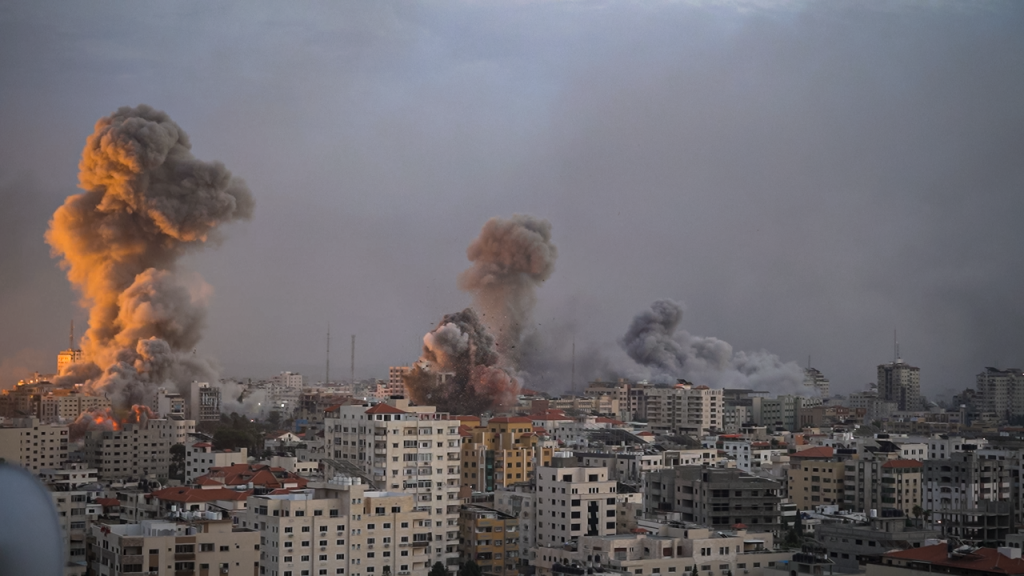
Let our political imaginations soar
Blätter für deutsche und internationale Politik 10/2025
Gaza and the age of impunity; Islamism and leftwing anti-Zionism; dead-ends of Staatsräson; illiberal rap.
Under the Netanyahu government, Israel has aligned itself with an autocratic international whose goal is to transform sovereignty into state impunity. The war on Gaza inaugurates a global era in which consensus itself has lost legitimacy.
Future historians looking back upon the Israel-Gaza conflict may see that it stands at the nodal point of three developments that together have fundamentally reshaped the coordinates of the international institutions established in the wake of WWII.
The first development is the end of neoliberal globalization and the emergence of protectionism and mercantilism among the major powers USA, China and Russia. These economic shifts bring with them a geopolitics whose dominant feature is the aim to build new spheres of influence by brazenly annexing territory and/or threatening to do so. Russia considers Ukraine an integral part of its ancestral lands (Ruskiy mir), while the US revives claims upon the Panama Canal and Greenland, and even proposes to annex Canada. China, for its part, raises sovereignty claims on Taiwan against the clear wishes of the Taiwanese people. Israel’s de facto annexation of the West Bank fits into this pattern. By fragmenting Palestinian territories and appropriating land, water and mineral wealth, Israel entrenches a permanent imbalance of sovereignty under the guise of security.
Though different in scale and context, these moves have the same consequence: they erode the most fundamental norm of the post–World War II international order, namely the prohibition on the use of force to acquire territory. Enshrined in Article 2(4) of UN Charter, this prohibition was the cornerstone of an international system designed to prevent a return to the destructive logics of conquest and aggression that had devastated the first half of the twentieth century. Although today’s powers frame their claims in the languages of security, sovereignty, or economic necessity, the underlying rationale is disturbingly similar: the normalization of expansionist policies that treat conquest as a legitimate path to strength in a competitive world order.
The rise of this new geopolitics has, secondly, severely damaged the multilateral human rights conventions in defence of universal civil and political, social, economic and cultural rights. The trend is towards bilateral agreements rather than multilateral conventions. One of the most important post-WWII documents, the UN Refugee Convention of 1951 is being shredded not only by the racist and xenophobic regimes of this world, but also by liberal democracies busy compromising principles of refugee protection in order to accommodate the rise of domestic ethno-national populism.1

Image: Jaber Jehad Badwan / Source: Wikimedia Commons
While the Cold War era was itself marked by blockages, vetoes and sharp East–West disagreements, bipolar rivalry created incentives for treaty-making. Each bloc sought global legitimacy by sponsoring universal norms, while the newly independent states of the Global South pushed hard for binding conventions as part of decolonization. This is why, despite intense ideological conflict, the Cold War decades produced a steady stream of multilateral agreements.
By contrast, today’s world order is characterized not by productive rivalry but by systemic fragmentation. Major powers now tend to undermine institutions rather than compete to strengthen them. The United States has attacked or withdrawn from multilateral bodies, China prefers regional or bilateral arrangements it can dominate, Russia flouts international law while dismissing global norms as Western tools, and the European Union is weakened by internal populist pressures.
The result is not deadlock punctuated by breakthroughs, as during the Cold War, but a structural environment in which consensus itself has lost legitimacy. Institutions are not just paralysed but actively delegitimized and defunded. Recent examples of this erosion include Israel’s relentless campaign to delegitimize and defund UNRWA, the UN agency for Palestinian refugees, thereby undermining the international consensus around refugee protection. Similarly, the United States has attacked and sanctioned the International Criminal Court, openly rejecting its authority whenever it threatens to investigate US or allied conduct. These assaults on human rights institutions demonstrate an intentional weakening of the very mechanisms designed to prevent states from retreating into unilateralism, power politics and impunity.
The third and, for the fate and future of Gaza most significant development is the emergence of an autocratic and sovereigntist international whose goal is to undermine international law and transform sovereignty into state impunity. While Israel’s war against the people and territory of Gaza has energized international lawyers, and while South Africa’s genocide case against Israel at the International Court of Justice has generated much respect, the statement by the Court that a ruling before the end of 2027 is unlikely has led to cynicism about the power of international law in general. In order to be believed, justice must not only be proclaimed.
The demand for impunity is most clearly visible in the behaviour of powerful states that openly shield themselves and their allies from accountability. The United States has long refused to subject itself to the jurisdiction of the ICC, and has extended this protection to Israel. Germany, too, has emerged as one of Israel’s most vocal defenders, providing arms and diplomatic cover even in the face of mounting evidence of a genocidal campaign unfolding in Gaza. Together, such acts of political protection demonstrate how international institutions are biased towards the interests of a few powerful states, who claim exceptional status for themselves and their allies.
The collision of these factors explains the passivity of the international community in permitting genocidal actions, crimes against humanity and war crimes to unfold in Gaza. Very few governments have the courage or conviction to defend the post-1945 international regime. And those that have attempted to do so, such as South Africa, pay a steep price: sanctions, diplomatic isolation, and the severing of political and economic ties with Israel’s powerful allies in the Global North. The costs of defending international law are increasingly borne by the few, while the many retreat into silence or complicity.
Hamas has also committed crimes against humanity through the mutilation and torture of innocent civilians, the abduction of children and the elderly, and the refusal to allow international organizations like the Red Cross to visit hostages. But that does not explain why, more than seventy-five years after the UN’s adoption of the Convention on the Prevention and Punishment of the Crime of Genocide, European leaders still prevaricate about the sale of weapons and materials to Israel.
Meanwhile, Trump sets a precedent not only through his obscene statements about converting Gaza into a riviera for the rich, but also through his own annexationist claims. The Israeli settlers who cause havoc and destruction in the West Bank can now cite as their example the world’s mightiest government. Sovereignty has become impunity and equals the power of the strongest to trample on the weakest.
For those like myself who believed that Israel had the right to defend its people against Hamas and its Jihadi allies after the brutal attacks of 7 October 2023, there came a point at which a compromise with Hamas was reasonable. Such a compromise, which would include the release of all Israeli hostages in exchange for Palestinian prisoners, seemed possible at the latest after the killing of Yahya Sinwar on 16 October 2024. But after an initial exchange between the two sides, the far-right ministers in the Israeli government increased their pressure on Netanyahu to escalate the devastation of Gaza’s cities, hospitals, universities, mosques and agricultural sites.
The claim made by the IDF that Hamas and its allies were hiding themselves and the hostages in underground tunnels, in some cases built under hospitals, mosques and schools is probably true, but it rings hollow. Such tactics were to be expected, after all. The actions of the IDF in Gaza, an army that once used to pride itself on using only ‘rubber bullets’, repeat the mistake of all imperial armies which, in chasing an elusive militia or guerrilla force, inflict disproportionate damage on the civilian population, which then mobilizes even more heavily against the occupying forces.
Israel’s claim that Hamas was not only hiding among civilian institutions, but also that international aid organizations were cooperating with Hamas, led to the defunding of UNRWA – the only multilateral organization whose mandate since 1948 has been to care for Palestinian refugees. The goal of the Israeli government is and continues to be the prevention of outside witnesses. Its murder of journalists in Gaza, above all Palestinian employees of international media organizations, intentionally creates what Hannah Arendt called ‘holes of oblivion’. The aim to ensure that the memory of those killed will be erased to the outside world, since there will be no one left to tell their story.
Yet there will always be someone who will survive to tell the story. For the last two years the images of the starving, maimed and wounded children of Gaza have stared at us from newspapers, social media sites and television sets. In the internet age, fake news will circulate but so will real news. Israel nurtures the mistaken belief of all authoritarian regimes that it can manipulate the truth forever. But as the half a million Israelis who demonstrated on 16–17 August 2025 show, ‘you can fool some of the people some of the time, but you cannot fool all of the people all of the time’. It is impossible to hide what happening in Gaza either from world public opinion or from the Israel public.
Under the Netanyahu government, Israel has become a ‘rogue state’, defying the laws of war, human rights law as well as humanitarian law, and perpetrating genocide, whether in the full legal sense or not, against the people of Gaza by destroying them and their future as a group
War, however, is profitable. According to a recent report by Francesa Albanese, United Nations Special Rapporteur on the Occupied Palestinian Territories, titled ‘From economy of occupation to economy of genocide,’ the Gaza war has led to a boom in the Israeli stock market (though not all would agree about the economic benefits). The Israeli weapons industry, and particularly, high-tech and AI-guided inventions such as exploding cell phones and pagers, have become the envy of autocrats the world over. With the cooperation of major tech organizations such as Palantir, Israel has now become a major player in the global AI-guided armament industry.
Taken together, these developments suggest that the Israel-Hamas war is not only a geopolitical crisis but also a prime site of entanglement between conflict, technology and capital. The transformation of military violence into a driver of financial gain and technological prestige raises urgent questions about the trajectories both of global security and the political imagination. Beyond the question of how to halt the immediate devastation and human plight, the conflict forces us to ask how war economies, particularly those underpinned by advanced technologies and transnational corporate alliances, shape the conditions of possible peace.
So far I have purposefully stayed away from debates about history – about whether Israel is a colonial state, and whether the Israeli-Palestine conflict can be understood in analogy to the French in Algeria, the Dutch and the British in South Africa, or the latter in India. Such analogies have two problematic consequences: first, they neglect the history of the Jews from Middle Eastern and other Asian countries (the Mizrahi) as well as the presence of Jewish communities in the Mediterranean region since their expulsion from Spain in 1492 (the Sephardim). Second, the Zionist fantasy of ‘a land without a people for a people without a land’ (Israel Zangwill) is thereby given credence. There were Jewish communities in the Middle East and the Mediterranean region long before the start of Zionist efforts to buy land and settle Israel/Palestine.
Today, more than half of the population of Israel is of Mizrahi descent, many of them from Arabic-speaking countries. It is therefore important not to impose the paradigm of ‘western colonialism’ upon their experience. Unlike the French or the British, the majority of ordinary Israelis had and have nowhere else to go – despite the fact that a small, well-connected and well-educated elite is today leaving the country. The colonial paradigm must be rethought and replaced by a paradigm of pluralist co-existence. The reactionary resolution of the Knesset, which declared that Israel is the ‘land and country of the Jewish people alone’, denies the history as well as the contemporary demographics of the land and country of Israel/Palestine, in which two million Palestinian Arabs are also citizens.
It is time to silence the sounds of war and to heal the wounds of the children of Gaza, and of all peoples in Israel/Palestine. Let our political imaginations soar: one state, two states, a confederation – international lawyers and political philosophers, refugee scholars and human rights experts will need to bring their good will and intelligence to bear upon the peoples of these lands, which includes Jews, Palestinians, Christians, Druze and Bedouin, so that they can build a future together.
The 19th century formula – one land, one people, one state – has been disastrous in this part of the world: just ask the Armenians, the Kurds and the Alevites. We need a multi-national confederation where the Orthodox Jew can pray at the tomb of Abraham and the observant Muslim can enter the Al-Aqsa Mosque, both without fear. A confederation also means self-government by peoples within a cooperative framework that would encompass air passage rights, the sharing of water and mineral resources, and participation in joint environmental stewardship. In a part of the world that is particularly susceptible to desertification, the Israel-Hamas War has inflicted immeasurable damage to the land, making vast terrains uncultivable. The task of the reconstruction of Gaza will require many decades.
The autocracies of the world have nothing to offer but death, destruction and more wars. But while the political paradigm of state impunity expands, its horrors are sending a message too. A peace agreement based not just on the release of hostages and prisoners, but also on the recognition of the self-determination rights of the people of Gaza and the West Bank, and on the exchange and demilitarization of territories, may signal the end of this awful global era we have entered.
This is an authorized and revised English version of the article published in German in Blätter für deutsche und internationale Politik 10/2025. An extended English version was first published in Völkerrechtsblog on 16.09.2025.
See Seyla Benhabib and Ayelet Shachar, Lawless Zones, Rightless Subjects. Migration, Asylum and Shifting Borders (Cambridge: Cambridge University press, 2025).
Published 22 October 2025
Original in English
First published by Blätter für deutsche und internationale Politik 10/2025 (German version); Völkerrechtsblog (extended English version)
Contributed by Blätter für deutsche und internationale Politik 1 © Seyla Benhabib / Blätter für deutsche und internationale Politik / Völkerrechtsblog / Eurozine
PDF/PRINTSubscribe to know what’s worth thinking about.

Gaza and the age of impunity; Islamism and leftwing anti-Zionism; dead-ends of Staatsräson; illiberal rap.

The decisive sex-change moment in movies, revealing a dramatic transformation, is far from reality. Transgender people face not only long assessment and surgery waiting lists but also bureaucratic hurdles when reassigning legal gender across countries, undermining their well-being and safety at a delicate time of becoming themselves.